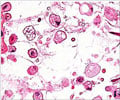Karnataka High Court directed the state-run Indira Gandhi Institute of Child Health (IGICH), to provide free treatment to patients suffering from (LSDs).

LSDs are a group of genetic disorders affecting specific enzymes. Missing or deficient enzymes cause toxic build-up of complex carbohydrates known as glycosaminoglycans (GAGs) in the lysosomes. This build-up disturbs the normal functioning of the cell and results in severe clinical symptoms of LSDs.
In this landmark decision, the court directed that the 18 Gaucher patients, 13 mucopolysaccharidoses (MPS) patients, 1 Pompe and 1 mucolipidosis patient be given free enzyme replacement therapy (ERT). ERT is one of the most expensive treatments ranging from 1-3 crores per annum per person. This prohibitive cost is a huge financial strain on the patients and families. Most people in India simply cannot access such expensive treatments, which lead to high mortality rates among patients with rare disorders.
A similar landmark judgement was given by the Delhi High Court in April 2014 directing the Government of NCT, Delhi to provide a 7-year-old Gaucher patient with ERT at AIIMS free of charge whenever he needed it (Apr 7 2014: Live Law News Network). According to Justice Manmohan who gave the judgement, health is not a luxury and access should not be restricted to a privileged few.
The Delhi HC had also said that the government needs to expand the health budget by increasing investment in the health sector. The ruling also listed suggestions relating to issues of access to treatment in cases of rare/genetic disorders. Significantly, the court suggested that the government of India should look into developing a policy for managing rare diseases and promoting the developing of orphan drugs.
There are nearly 7000 rare diseases ranging from rare cancers, blood disorders, auto-immune disorders, lysosomal storage disorders and congenital anomalies. Almost 7 million Indians suffer from rare diseases. The Organization for Rare Diseases (ORDI), Bangalore was set up in order to facilitate diagnosis, treatment and management of these diseases. According to founder-member, Dr. Vijay Chandru, there is a genetic basis for almost 80 percent of rare diseases. ORDI’s role is to enable patients and families access quality treatment and improve their quality of life.
The Union Government released the Draft National Health Policy in January 2015. This draft was placed in the public domain till 28 February 2015 for public consultation. This draft policy is the first iteration since 2002. This policy indicates that health is a fundamental right and denial of health rights is a punishable offence. The policy also proposes to increase public health expenditure from 1.2% of the GDP to 2.5%. The policy indicates universal access to free drugs and diagnostics in government-run hospitals and health centers.
Another area that needs to be tackled is India’s existing health insurance policy sector. There seems to be clear misalignment between health care players and health care delivery in that those who really need health insurance coverage are outed as pre-existing conditions are not covered. Most insurance policies specify a waiting period of 3 or more years and even this does not guarantee coverage of rare/genetic diseases. Most of these diseases require outpatient treatment without hospitalization, which is not covered. No insurance policy covers the drug costs. This lop-sided health insurance scheme blatantly excludes people with rare/genetic diseases for whom health coverage is absolutely essential. Private insurance players are unlikely to extend to rare/genetic diseases. However, a comprehensive health policy on rare/genetic diseases can actually put in place specific health insurance policies, which can be offered by public sector general insurance companies. It is necessary to push for health insurance reforms through IRDA (Insurance Regulatory and Development Authority of India) and the government intervention.
A robust health policy along with a health insurance scheme is critical to ease the financial burden of rare/genetic disorders. As quoted in the draft national policy, “the attainment of the highest possible level of good health and wellbeing, through a preventive and promotive health care orientation in all developmental policies, and universal access to good quality health care services without anyone having to face financial hardship as a consequence.” If the goal is indeed to provide universal health access, the government of India must come up with a policy relating to rare/genetic disorders because 7 million people cannot be excluded from right of access to quality healthcare and treatment.













